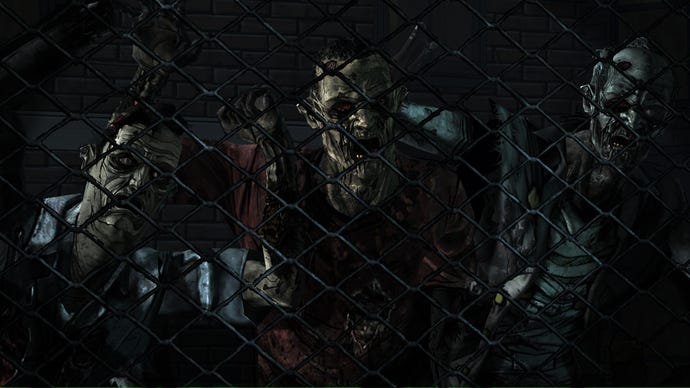Walking Further: Delving Into Visual Novels
With this week's release of The Walking Dead: 400 Days, a whole lot of you are doubtless going to be hungry for more story-heavy action soon. Here's a roundup of some other experiences you might want to try.
This article first appeared on USgamer, a partner publication of VG247. Some content, such as this article, has been migrated to VG247 for posterity after USgamer's closure - but it has not been edited or further vetted by the VG247 team.
Telltale's The Walking Dead was a triumph in many ways, but one of the most interesting things about it to me was how many people accepted the fact it prioritized story over gameplay without complaint.
Over the years, as gaming technology has got better and better, one mantra has remained relatively constant until fairly recently: "gameplay is king."
When the CD-ROM era launched and we started getting all manner of multimedia extravaganza games featuring B-list actors making cameo appearances in grainy full-motion video sequences, many of these titles were (usually justifiably) panned for their gameplay taking a back-seat to their flashy presentation. Of course, the fact that many of them were just plain badly-written didn't help, either, but the fact remained that asking the player to sit back and watch for more than a few seconds at a time remained somewhat taboo.
These days, however, both players and developers are a little more understanding of the fact that different people want different types of experiences from video games. Some still want the thrill of clasping the controller tightly in their hands, directing every aspect of the experience from the moment they fire it up to the moment they switch it off; others, however, are more than happy to enjoy more passive experiences, where they watch a story unfold and occasionally make a choice or two to direct where it ends up.
The Walking Dead pleased those who enjoyed letting a story wash over them, and also those who like to take full control of a game's protagonist.
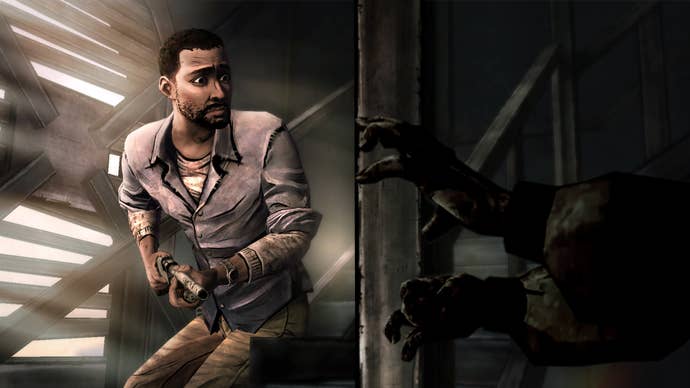
The Walking Dead succeeded because it appeased both groups to a certain extent. It pleased those who enjoyed letting a story wash over them with its well-told narrative, and it also pleased those who like to take full control of a game's protagonist by allowing them to feel as if they were "doing" things, even if many of those events were actually completely out of their control in the wider context of the overall plot. The overall experience did err somewhat on the side of "narrative" rather than "gameplay" as a whole, however.
This week sees the release of The Walking Dead: 400 Days, a series of short vignettes that tell stories from the first 400 days of the outbreak. It's not a "sequel" to the adventures of Lee and Clementine, but your choices made throughout Season One of the mainline game will have an impact on certain aspects of 400 Days, so you'll probably want to play it on the same platform you played Season One on.
What next, though? 400 Days won't last forever, as much as some of us would like it to, and Season Two is still likely a way off yet. So what should you play in the meantime if you're hungry for more interactive stories that will tickle you in the Feels and quite possibly make you weep openly and uncontrollably?
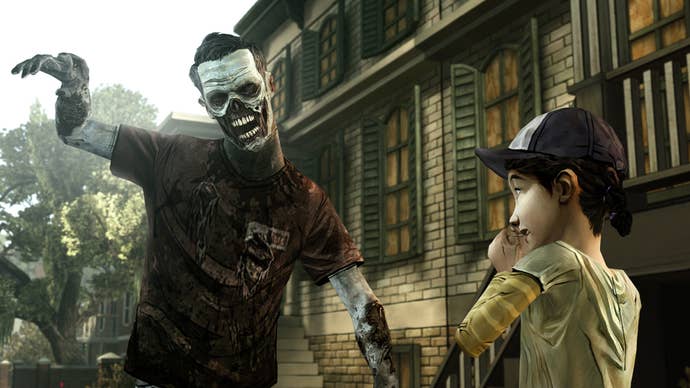
Well, dear reader, may I recommend the visual novel medium? It provides precisely what you're looking for, albeit perhaps with a tad more text than you're used to, and unless you're already a visual novel devotee, me or someone I've bellowed about these games to over the years, I can almost guarantee you probably haven't played most or all of these.
Many of you will likely already be familiar with games such as 999 and its sequel Virtue's Last Reward, the Ace Attorney series and To The Moon, since all of them have received a decent amount of press coverage over the years. (If, on the off-chance, you're not familiar with any of those titles, go play all of them, and I'll meet you back here when you're ready.)
As such, I'm going to focus on slightly less well-known titles today, all of which are Japanese in origin, and outline a few interesting things about each one that might intrigue you enough to give them a try. I'm also only going to focus on titles that are officially and commercially available in English-speaking Western markets, before anyone brings up Fate/Stay Night or Steins;Gate. This is by no means intended to be an exhaustive list; if you're a visual novel fan and you have some particular favorites that aren't covered here, let's hear 'em, along with why you like them.
We'll begin with probably the most well-known title on this list: Corpse Party.
Corpse Party
Team GrisGris' Corpse Party actually has a surprisingly long history: beginning as an RPG Maker game for the PC-9801 in 1996, it was subsequently ported to Windows in 2008, to PSP in 2010 and iOS in 2012, though the only version we saw in North America was the PSP one, courtesy of localizer Xseed Games. It performed well enough for Xseed to bring the quasi-sequel Book of Shadows to English-speaking markets, and hopefully we'll see more in the future. Both Corpse Party and Book of Shadows are fully compatible with Vita.
Corpse Party is a horror-themed visual novel in the tradition of Japanese ghost stories. A party of students are trapped in a creepy old ruined school after an occult ritual goes horribly wrong, and it's up to the player to uncover the truth of what's going on while saving as many as you possibly can.
In the tradition of good horror movies, Corpse Party has a large cast of characters, not all of whom survive to the end credits. All of them are extremely well-written, well-defined characters, though, which makes it all the more horrifying when you witness them suffering.
Corpse Party makes a meta-game out of these bad endings, encouraging you to "collect" them all and see how these characters can suffer.
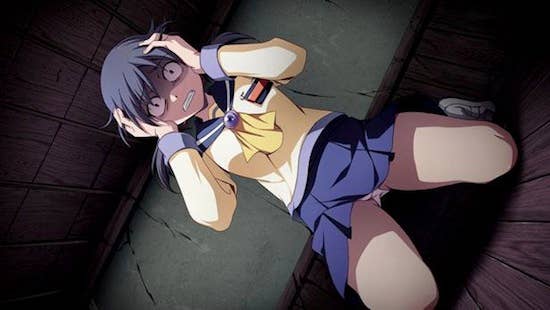
Unlike most visual novels, Corpse Party doesn't see you cast in the role of a single protagonist character. Rather, you take on the role of an omnipresent, omniscient observer, directing different characters at different times from a top-down RPG-style perspective. Make no mistake, though; this is a visual novel through and through. There is one single "correct" route through the game, and a whole host of "Wrong Ends" to witness along the way. Interestingly, Corpse Party makes something of a meta-game out of these horrible bad endings, encouraging you to "collect" them all and see all the different ways these characters can suffer.
Corpse Party is worth playing for a number of reasons, chief among which is its spectacular use of sound. Not only does the game have some amazing Japanese-language voice acting featuring some of the most believable emotion I think I've ever heard in a game, it also makes use of some amazing 3D sound effects that will have you looking over your shoulder in fright more than once. Play this one on headphones, folks.
Corpse Party is also a prime example of how "less is more" when it comes to horror: the game's most unpleasant scenes unfold as nothing more than a black screen, occasional flashes of color, text, sound and voice -- no graphics at all.
Lifesigns: Surgical Unit
This Nintendo DS game suffered somewhat from rather unfair comparisons to Trauma Center when it came out, and it's easy to see why: Trauma Center featured short and snappy visual novel-style cutscenes to punctuate its fast-paced surgery sequences, so it was understandable that people were perhaps expecting something similar from another medical-themed game that appeared to feature surgery as a core gameplay mechanic. It was disappointing that this led to poor review scores, however, as Lifesigns is actually a rather interesting game.
Lifesigns, as you've probably surmised by now, is a very different beast from Trauma Center. This is a game where the unfolding story, not the surgery, is the most important aspect. Taking on the role of one Dr. Tendo, you'll work your way through five discrete "episodes," each of which focuses on the treatment of one headline patient, and which may also incorporate a few others along the way depending on how things unfold. Each episode has several endings according to your actions and your performance in various minigames (including the surgery sequences) along the way, and things don't always end well. In fact, sometimes they end very, very badly.
Things don't always end well. In fact, sometimes they end very, very badly.
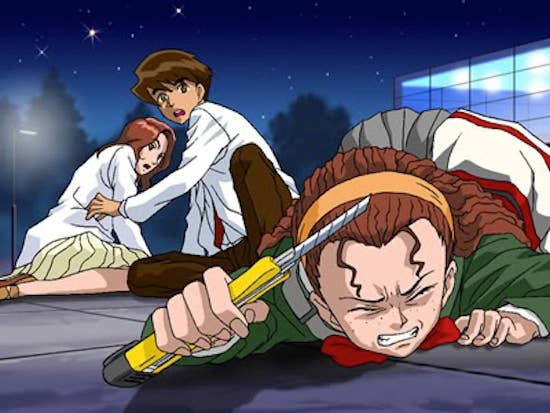
Lifesigns is noteworthy for the fact it doesn't pull any punches. Characters can and will get hurt and die -- including main cast members. The game does a good job of helping you understand who these people are before placing them in peril, so if and when something bad does happen, you care about the people involved and want to help them.
Lifesigns has its flaws -- the surgery sequences are more tests of memory than skill, and the other minigames are sub-Flash game quality -- but the overarching storyline is compelling enough to maintain interest from start to finish despite these issues. It's also interesting to see the Ace Attorney approach applied to a different profession, and makes me wish there were more medical-themed games of this type on the market.
Kira Kira
Kira Kira is a Japanese visual novel for PC from a company called Overdrive, brought to the West by localization specialist publisher Mangagamer. The translation isn't the best it could be, but it's certainly readable and the story remains intact.
The game is available in both all-ages and adults-only format, though the number of sex scenes in the adults-only version is minimal. There's also an iOS version, which is a port of the all-ages version due to Apple's refusal to allow adult content on the App Store.
Kira Kira is a coming-of-age road trip visual novel that casts players in the role of Shikanosuke, a young man who is in a strange transitional period of his teenage years. Health issues caused him to have to drop his one true love, tennis, and he's split up with his girlfriend at the outset of the game. Through various circumstances, he finds himself roped into helping out his school's Second Literature Club form a band to perform at the school's festival. Following this, Shikanosuke and his new friends take a tour around Japan, performing in various locations and coming to terms with who they are as people.
I defy you to come out of one of Kira Kira's three main "routes" with dry eyes.
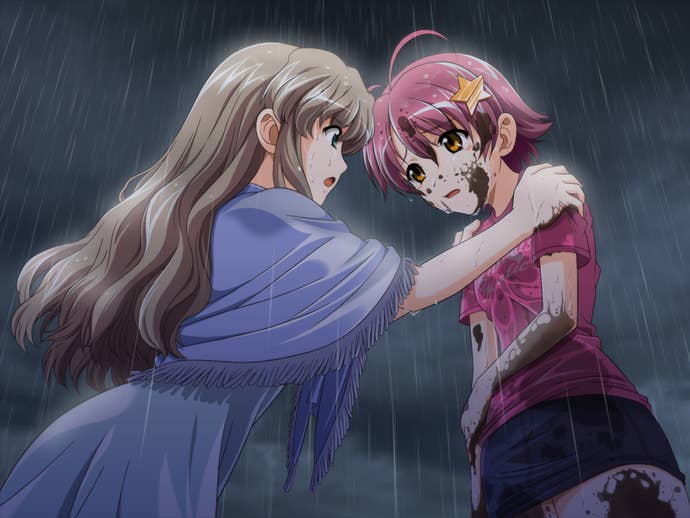
Kira Kira is a largely non-interactive visual novel in that there are relatively few choices to make over the course of the whole game. This doesn't make it any less compelling, however; the combination of its well-drawn art, excellent music and quality Japanese-language voice acting help make it a very immersive experience that draws the reader in and keeps things interesting throughout.
Where Kira Kira is most noteworthy is in its different endings. The latter part of the game is completely different depending on which of the game's three heroines Shikanosuke falls for, and each has interesting things to say about issues which remain just as pertinent to older readers as they do to the teenage cast. It also doesn't pull any punches -- without spoiling anything, let's just say that I defy you to come out of one of the three main "routes" with dry eyes. There's also a "true" ending that you can only see after witnessing the three main endings, as well as a series of other conclusions that bring the story to a somewhat premature halt at various points.
Kira Kira is also interesting in the subject matter it tackles. Besides the usual slice-of-life teenage angst, it looks at issues such as how you perceive yourself, transvestitism, homosexuality, abusive relationships, self-harm, growing up in a broken home and all manner of other cheery business. Despite these somewhat heavy themes, it manages to maintain a fairly light-hearted, cheerful tone throughout for the most part -- though it's not afraid to crank up the emotional pressure when it matters.
Kana Little Sister
Kana Little Sister is a PC game that was originally developed by a Japanese company called D.O. in 1999, and brought to the West by G-Collections in 2002. It's one of the more well-known Japanese visual novels out there, though not necessarily for the right reasons.
In Kana Little Sister, you take on the role of Taka, brother to the eponymous heroine. Kana is dying from chronic renal insufficiency, though through sheer force of determination she manages to survive well into her late teens, much to the astonishment of her doctors. The game's narrative explores a number of different themes: how a terminally ill person deals with the concept of their impending death; how their family deals with the same thing; how growing up with a family that isn't quite "normal" affects you and your interpersonal relationships in the long term; how someone sheltered from the world at large can live a happy life; and, of course, the forbidden love between brother and sister.
Kana Little Sister is an "utsuge" -- a Japanese term that translates to "depressing game."

It's the incestuous aspect of Kana Little Sister that puts a lot of people off -- particularly as it's an adults-only title -- but without spoiling it I'll just say that it's handled tastefully, sensitively, and not altogether unlike a lot of other more mainstream Japanese media handles this sort of subject matter. It is also not the most important part of the narrative.
Kana Little Sister is what's known as an "utsuge" -- a Japanese term that roughly translates to "depressing game." It's clear from the outset that Kana probably isn't going to survive until the end credits; the exact circumstances of her departure from this mortal coil depend on the choices you make as Taka over the course of the complete story, as do the different manners in which Taka deals with his sister's passing -- or doesn't deal with it, as the case may be.
Kana is a difficult, challenging read and various aspects of its subject matter may be offputting to some, but if you found yourself responding strongly to the more tragic, tearjerking parts of The Walking Dead, you may also appreciate the amount of emotional engagement present in Kana.
School Days HQ
The last title on this list is more of an interactive movie than a visual novel, and interestingly has a decent amount in common with the Walking Dead in terms of structure, if not content.
School Days HQ is a remake of a 2005 game, developed by a Japanese company called 0verflow and brought to the West by JAST USA. It describes itself as a fully-animated visual novel, but is actually more of an interactive anime series. Indeed, such was the popularity of the original game in its native Japan that it spawned its own manga, anime TV series, audio drama and standalone animations, though it remains largely unknown over here, perhaps in part due to the game's adults-only nature.
School Days is a slice-of-life story that casts players in the role of Makoto Itou, a high school student who is obsessed with a girl he sees on the train every day. His classmate Sekai agrees to help him get together with the mystery girl -- whose name is Kotonoha -- but steals a kiss from him as "payment" for her help. As you can probably imagine, this leads to a whole mess of conflicting emotions, culminating in one of over 20 different endings in which at least one person is going to end up very, very hurt either emotionally, physically or, in some particularly unpleasant cases, both.
I'll just say "beware of the yandere" and leave it at that.

School Days is particularly noteworthy due to its convoluted "route map" that depicts all the possible choices you can make throughout the game. Unlike most visual novels, which tend to lock you in to a particular story path after a while, School Days has a whole host of branching narrative pathways that twist and turn around each other -- and different routes can lead to the same conclusion, but with a whole new sense of context attached. In this sense, it's somewhat similar to The Walking Dead, which proceeded down the same narrative path regardless of choices in many cases, but which had very different meanings according to what came before. School Days also features timed decision points, much like The Walking Dead, and in all of these cases, remaining silent or doing nothing is always an option.
It's the massive range of possible outcomes and paths through the story that makes School Days interesting to play. A single playthrough doesn't really do justice to the complexity of the game's characters; it's only by playing through various different routes that you get a full sense of who these people are -- and in most cases, they're probably not the people you thought they were when you first encountered them. I'll just say "beware of the yandere" and leave it at that.
